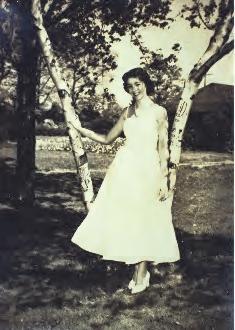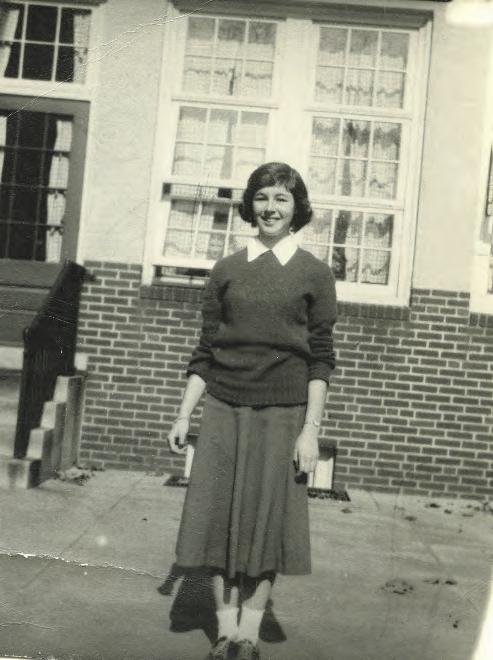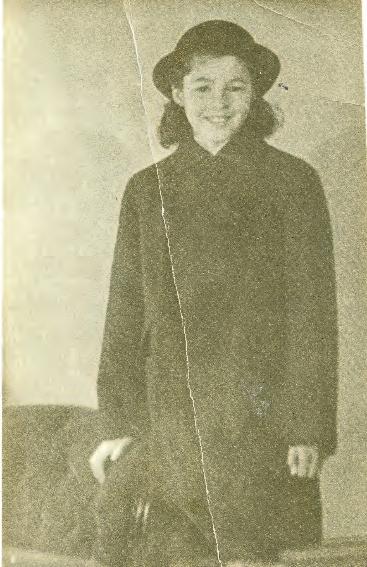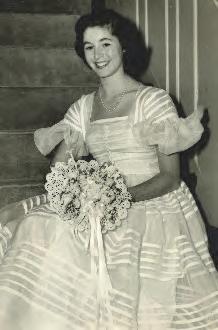
5 minute read
High School
by Udon Map
HIGH SCHOOL
It was 1946 when my mother withdrew me from public school, strangely named Henry’s Barnyard, and enrolled me in the fifth grade at Lincoln School. A Quaker all-girls prep school, I was one among four Jewish students, abiding by the school’s quota of four Jews per class. Predictably, we banded together, yet assimilated as much as possible with other girls, with whom I reconnected at a reunion some fifteen years ago in Providence.
Advertisement
At the Lincoln School Reunion, three impressive facts: the girl who had been our class beauty and brain was barely recognizable, now heavy in frame and a hairstyle from hell. Edie, one of my best buddy Jewish friends, all but ignored me at the Reunion. Joyce, once a shy, skinny, inhibited girl presented as a bombastic, splashy Hollywood blond. Poor Susan, our other

Jewish ally, had died of sepsis resulting from an encounter with an open dishwasher door.
Going back in time, school had rules aplenty. Each morning we had Quaker meetings, no talking, only meditation. My particular meditation centered on which clothes I would wear that weekend. We wore green and white uniforms, and studied hard in preparation for the SATs and performance in college. We were assigned lengthy “papers” for which we used index cards, lined paper and pencils or pens. We had no computers. When I got to college, I had disciplined habits for studying, taking notes, organizing outlines and planning my time.
At high school we had study hall, and if you as much as talked or chewed gum, you received a detention notice. Gym was very popular, and during hot spring days ‒ as I had developed breasts early ‒ I covered up by wearing long sleeved sweaters even though I could have filled a bathtub with perspiration. My friend Susan told me I was nuts – but actually, she got me into a whole lot of trouble so that the Latin teacher warned me not to “be friends with her.” I never listened, and one day Susan and I skipped class, put on heavy boots and wandered over to a swampy area where we fell into a cesspool.
This mischievous Susan and I giggled so uncontrollably during any public recitation that I had to skip school one day in order to avoid a poetry reading which Susan and I were sharing. Parenthetically, Susan “got me” to join a sorority, and pledging was particularly painful when gangs of girls pummeled me with watermelon, paint, rubber balls, and the like. Upon hearing this, Susan’s mother, Ceil, called and read them the riot act. However, I was chosen as The Beauty Queen at the Atlantic City Sorority Parade, an activity forbidden to me by my mother who declared: “You will develop your brain, not your looks!”

At school, the curriculum included five years of Latin. It was taught by a teacher whom we inexplicably nicknamed The Pigeon. We read the Aeneid and the Iliad in Latin, no easy chore, but it probably facilitated my lifelong ease with language. Edie, referred to above as a best buddy, got thrown out of class for using a “trot.” Unperturbed, we jumped onto the back of a department store truck and “hitched” a few blocks into “Wayland Square” where we frequently lunched in a sedate dining room in the Wayland Manor where my father had a charge account. We always used it and probably never left a tip. (Parenthetically, Edie went on to become a writer of note, a runner up for the National Book Award for her wonderful short stories, “Binocular Vision.”) Previously, she appeared on and won several TV quiz shows in New York, later becoming beleaguered by cancer which spread to the brain, neutralizing the cerebral talents so indispensable to her humor, writing, and personality ‒ a tragedy which many of our high school classmates bemoan to this day.
High school years in Providence were happily replete with dates aplenty with Brown College boys. My friends and I went to many proms for which my mother bought me gorgeous, full length, strapless gowns embroidered with flowers and laces, colored in periwinkle and pink and white. Boys gave me corsages and stuffed animals. We went to fraternity parties, boat races on the Charles River in Cambridge, as well as at home fancy dinners, engineered by my mother, who prepared souffléd sweet potatoes and gourmet chicken dishes served in deep silver bowls, which we ate from authentic bone china plates in our dining room while I would have been just as happy with hot dogs served in the kitchen.

I don’t mean to be unfair to my mother. She was solidly behind me, a homebody who guaranteed my social and educational status. She never embarrassed me in front of boys – and even told one off royally. He had stood me up for the high school senior prom, called to apologize, yet never was allowed to talk to me. ”Why won’t you put Margie on the phone?” was his question. My mother’s reply was “It’s nothing you would understand, it’s all a question of breeding.” Not my first choice of rejoinders – but at age 15ish my options were limited.
Meanwhile, my father was working and spoiling us with steak dinners – while generously allowing my mother to deck us out in lovely clothes, choose the best summer camps, and treating us to occasional trips to New York City where we went to shows, always followed by corned beef sandwiches and pickles at the Stage Deli. I remember running down Broadway in snowsuit and boots, hearing my mother say “Look up, this is the famous Times Square, see the huge ads and moving newsreels.” We always stayed at the Park Lane, ordered coffee and croissants for breakfast from room service, and loved Rumplemeyer’s, a colorful and scrumptious restaurant for lunch. Dinners were always at the same steak place, my father content with their reasonable prices and martinis. One time, as we boarded a return train to Providence, my mother suddenly remembered that she had left her fur coat in the hotel room. It took less than a second for her to jump off the train, dash to the hotel, reclaim her coat, and board a later train! I’ll never forget it.
To conclude high school years, 1953 saw graduation, relief to be attending a top college, and all the usual preparation for leaving home. Anticipation trumped fear, particularly since I already knew girls at Smith College and others, like me, attending as freshmen. Further, I had practically pulled college choices out of a hat as opposed to the exhausting research and application process beguiling high schoolers today. Eyes wide shut(!), I went and ‒ typical of the times – questioned little and dove into the first thing crossing my path.










